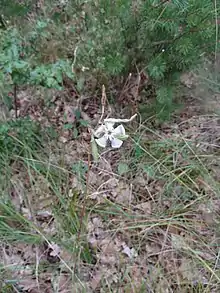| Silene paradoxa | |
|---|---|
 | |
| Near Valréas, France | |
| Scientific classification | |
| Kingdom: | Plantae |
| Clade: | Tracheophytes |
| Clade: | Angiosperms |
| Clade: | Eudicots |
| Order: | Caryophyllales |
| Family: | Caryophyllaceae |
| Genus: | Silene |
| Species: | S. paradoxa |
| Binomial name | |
| Silene paradoxa | |
| Synonyms[1] | |
|
Viscago paradoxa (L.) Fourr. | |
Silene paradoxa, the Dover catchfly, is a species of flowering plant in the family Caryophyllaceae, native to southeastern France, Corsica, Italy, the former Yugoslavia, Albania, and Greece.[1][2] It can grow on serpentine soils and copper mine tailings.[3]
References
- 1 2 "Silene paradoxa L." Plants of the World Online. Royal Botanic Gardens, Kew. Retrieved 1 May 2022.
- ↑ "Silene paradoxa Dover catchfly". The Royal Horticultural Society. 2022. Retrieved 1 May 2022.
- ↑ Gonnelli, Cristina; Galardi, Francesca; Gabbrielli, Roberto (2001). "Nickel and copper tolerance and toxicity in three Tuscan populations of Silene paradoxa". Physiologia Plantarum. 113 (4): 507–514. doi:10.1034/j.1399-3054.2001.1130409.x. hdl:2158/252789.
This article is issued from Wikipedia. The text is licensed under Creative Commons - Attribution - Sharealike. Additional terms may apply for the media files.